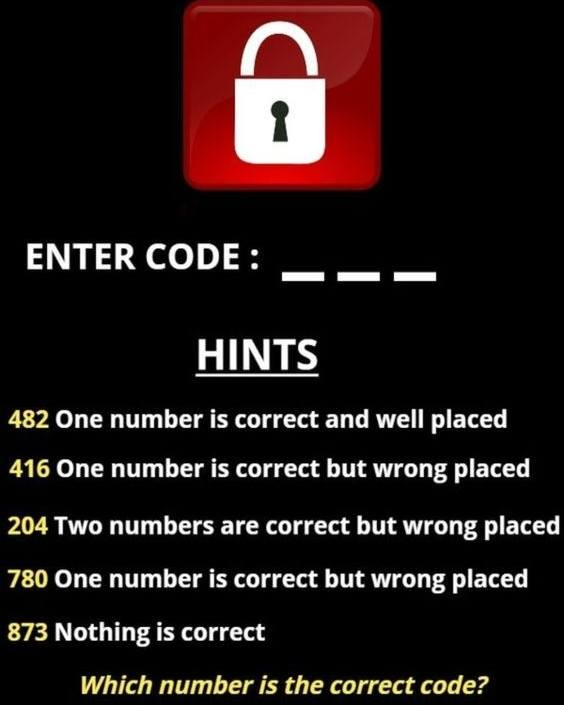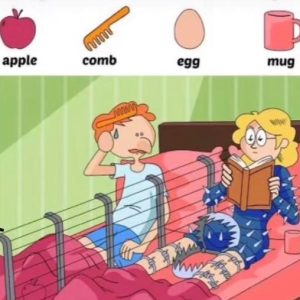Are you ready to put your logical reasoning to the test? This classic three-digit code puzzle challenges your ability to think critically and piece together clues step by step. The goal is to unlock a virtual lock by deciphering the code based on a series of cryptic hints. Each hint offers different clues about the digits in the code and their placement.
So, do you think you have what it takes to solve it? Before jumping to conclusions, take a moment to analyze each hint thoroughly. In this article, we’ll guide you through the puzzle-solving process, breaking down each clue step by step to uncover the correct code.
Step-by-Step Solution: Analyzing Each Hint

Let’s tackle the puzzle step by step, carefully examining each hint to identify the three-digit code:
Hint 1: 482 – One Number Is Correct and Well Placed
This hint tells us that one of the digits in “482” is correct and in the right position. We don’t know which digit it is yet, but we need to remember that it’s correctly placed.
Hint 2: 416 – One Number Is Correct but Wrongly Placed
In this hint, one of the digits is part of the code, but it’s not in the right position. We need to find out which digit this is and adjust its position later.
Hint 3: 204 – Two Numbers Are Correct but Wrongly Placed
Here, we know that two of the digits in “204” are correct, but both are in the wrong positions. This hint will help us further refine our digit placement.
Hint 4: 780 – One Number Is Correct but Wrongly Placed
This hint indicates that one of the digits in “780” is part of the code, but it’s not in its current position. Since “8” and “7” have been eliminated from previous hints, we can deduce that “0” is correct, but not in the third position.
Hint 5: 873 – Nothing Is Correct
This clue is extremely valuable because it allows us to eliminate “8,” “7,” and “3” from all possible considerations. This simplifies the puzzle significantly.
Breaking Down the Clues: Identifying the Code
Now, let’s piece the information together based on the hints:
1. Eliminating Digits Based on Hint 5 (873)
Since none of the digits in “873” are correct, we can immediately eliminate 8, 7, and 3 from all other hints. This helps narrow down the possible digits for the code.
2. Analyzing Hint 4 (780)
With “8” and “7” already eliminated, we know that 0 is the correct digit from this hint. However, since it’s incorrectly placed in the third position, 0 cannot be the third digit of the code.
3. Revisiting Hint 1 (482)
Since “8” is eliminated, the correct digit in this hint must be either 4 or 2. Based on further analysis of other hints, we find that 2 is correctly placed in the third position.
4. Re-evaluating Hint 3 (204)
This hint tells us that two digits are correct but wrongly placed. We already know that 0 is a correct digit and must be moved to the first position. Additionally, we confirm that 2 is correct and placed in the third position.
5. Finalizing Hint 2 (416)
We already know that 4 is a possible correct digit, but it’s not in the first position. The only remaining option for the second digit is 6, which fits perfectly with the information provided by other hints.
Final Code Solution: Putting It All Together
Based on the analysis above, we can now determine the correct three-digit code:
- 0 is in the first position.
- 6 is in the second position.
- 2 is in the third position.
Therefore, the code is 062.
Conclusion: Did You Solve the Puzzle?
Congratulations if you arrived at the correct code of 062! This puzzle required a combination of logical thinking, careful analysis, and strategic elimination. It’s a great example of how synthesizing information from multiple clues can help reveal the solution to a seemingly complex problem.
Logic puzzles like this one are not only fun but also a fantastic way to enhance your critical thinking skills. They challenge you to pay attention to details, think creatively, and approach problems from different angles. If you enjoyed solving this puzzle, be sure to try more brain teasers to keep your mind sharp and engaged.
So, how did you approach the puzzle? Did you manage to crack the code on your first try, or did you need a few attempts? Share your experience in the comments below, and keep puzzling!


